-
 11 min. read
11 min. read
-
 Sarah Berry
Sarah Berry Lead Web Marketing Consultant
Lead Web Marketing Consultant
- Sarah Berry is a Lead Web Marketing Consultant at WebFX. With more than 10,000 hours of experience, she offers practical insights and strategies you can use to grow your digital revenue. When she isn’t polishing her Time Magazine Person of the Year Award, she’s spending time with her flock of ducks.
What is page speed?
Page speed refers to how quickly a webpage loads and displays its content, which greatly impacts user experience and search engine rankings.
“Talladega Nights: The Ballad of Ricky Bobby” may have come out more than 10 years ago, but Ricky Bobby’s famous quote, “I wanna go fast!” still rings true — especially when you’re talking about page speed. Page speed (also mistakenly called site speed) measures how fast content on a page loads. If you want your site to drive traffic, orders, in-store visits, or phone calls, you must have a fast page speed.
Settle for a slow website, and your site will take the last place in search results, leaving your customers to your competitors.
Keep reading to get answers to your biggest questions about page speed, from “What is page speed?” to “How do I speed up my website?”. If you’d like immediate help with improving your page speed, call us at 888-601-5359 or contact us online to learn how our page speed optimization services can help!
Get Your Checklist for Accelerating Your Page Speed
What is page speed?
Page speed measures how fast content loads on a single page. In some cases, developers will refer to page speed as page load time, which is how long it takes a page to display all its content, or time to first byte, which is how long it takes a web browser, like Google Chrome, to receive the first byte of information from your web server.
What is site speed?
In comparison, site speed measures page speed, but for a sample of page views on your site.
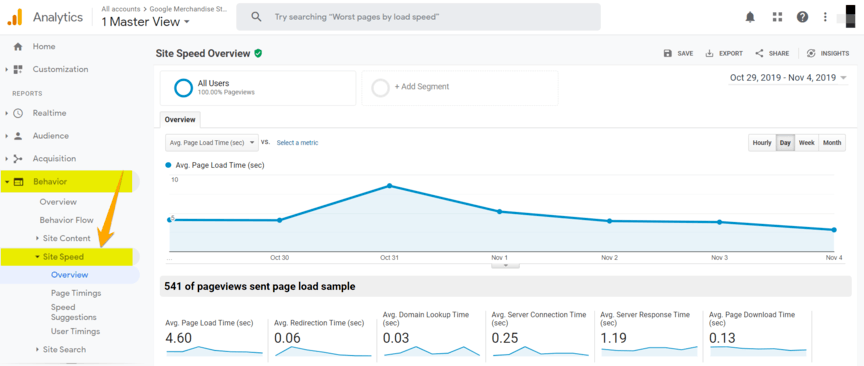 You can review your site speed in Google Analytics, which comes with a Site Speed report. Just log in to your account, select “Behavior” from the sidebar menu, and then choose “Site Speed” to see how your website performs.
You can review your site speed in Google Analytics, which comes with a Site Speed report. Just log in to your account, select “Behavior” from the sidebar menu, and then choose “Site Speed” to see how your website performs.
How to check your page speed instantly
Learn how fast your website is by checking your page speed instantly with Google’s PageSpeed Insights. 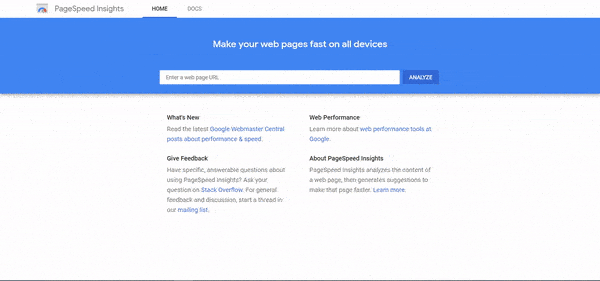 This free SEO tool will provide an overall score for both your mobile page speed and desktop page speed — the average page load speed for mobile is 27.3 seconds and the average page load speed for desktop is 10.3 seconds.
This free SEO tool will provide an overall score for both your mobile page speed and desktop page speed — the average page load speed for mobile is 27.3 seconds and the average page load speed for desktop is 10.3 seconds.
However, it’s most important to focus on your mobile page speed. With more than 50% of Internet traffic coming from mobile devices, Google now focuses heavily on the mobile experience due to its mobile-first index, so you want a fast site for smartphones. 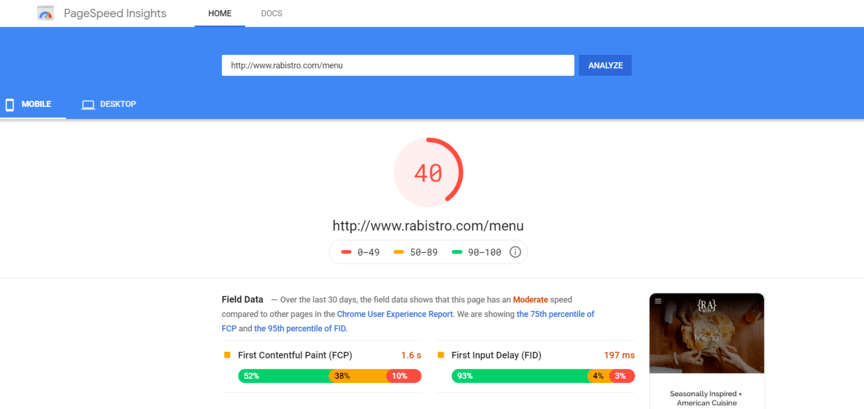 In addition to your score, you’ll have several different data points, including:
In addition to your score, you’ll have several different data points, including:
- First Contentful Paint
- First Meaningful Paint
- Time to Interactive
- First Input Delay
If you don’t have a developer background, focus your attention on First Meaningful Paint and its speed. First Meaningful Paint describes how long it takes your page to load enough resources for users to interact with your content. Your page may not load 100% in one second, but it loads enough for users to interact with your page.
A fast score means users can interact with your content sooner, which makes them less likely to leave. 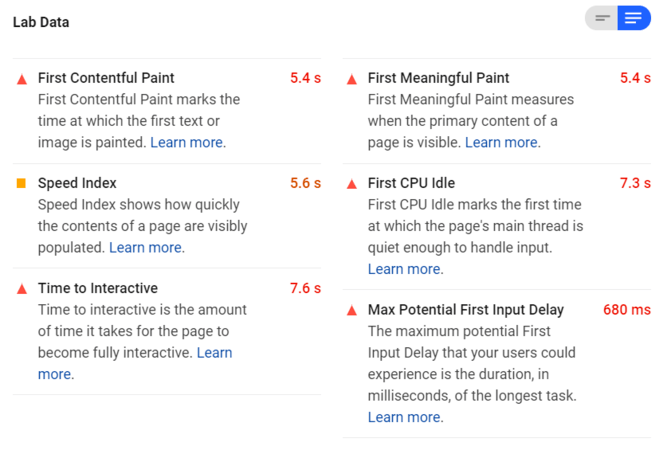 If you’d like to check your page speed with other tools, there are some alternatives to Google, including:
If you’d like to check your page speed with other tools, there are some alternatives to Google, including:
While you can use these tools, it’s helpful to check your speed via PageSpeed Insights because this tool lets you see how Google views your site and its speed. You can then use your results (and Google’s advice) to improve your site’s speed and rankings in Google search results.
Why is page speed so important?
Your page speed matters for two critical reasons:
Search engines
If you’re familiar with search engine optimization (SEO), then you’ve probably heard some chatter about how page speed matters to SEO — and it does. Search engines (and users) like fast websites.
In fact, 40% of users will abandon a page that takes longer than three seconds to load.
That’s why search engines like Google use page speed as a ranking factor. Adopting page speed as a ranking factor allows search engines to improve the user experience. They’re not only providing users with the information and answers they want but with the experience they expect.
“You can’t settle for a page two or page 10 ranking.
If you want to grow your business, then you need a page one ranking, and that demands a fast website.”
If search engines consistently delivered the wrong answers and agonizingly-slow websites, people would stop using those search engines. They’d switch to another search engine, like Bing. That’s why search engines now use page speed as a ranking factor.
Why care what search engines think about your site, though? Or, even how they rank them? People rely on search engines for every part of the purchasing funnel, including discovery, research, and making a purchase.
So make it easy for your prospects to convert on your SEO landing pages by improving their page speed.
Almost 95% of online experiences start with a search engine. If your company wants to reach new leads online, then you can’t ignore search engines and search engine optimization. You also can’t settle for a page two or page 10 ranking.
If you want to grow your business, then you need a page one ranking since most users remain on the first page. Studies show, for example, that 75% of users stick to the first page, and 75% of clicks go to the first three results on page one.
Users
When you input a search query on Google, you don’t want to wait for an answer. You expect your search results (and the result you click on) to load quickly.
When they don’t, you get frustrated and find your answers elsewhere, and likely choose another website from the list of search results. Like 83% of users, you probably expect sites to load in three seconds or less. That’s why faster websites tend to perform better in not only search results but also in sales and revenue.
They provide a user experience that people want and demand. For perspective, did you know that mobile sites that load in two seconds or less boast a 15% higher conversion rate? If you provide people a fast and seamless experience, you make it even easier for them to buy from you.
How to speed up your website
Now that you have your page speed results, as well as know why a fast website matters, how do you speed up your website?
Page speed optimization, sometimes called website speed optimization, encompasses a range of steps and tactics. Get a preview of these strategies now:
Compress your files
Your website consists of CSS, HTML, and JavaScript files. 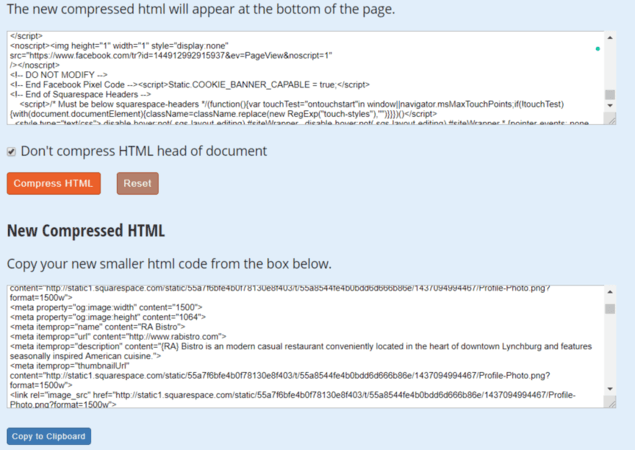 If you want to improve your page speed, you can compress these files to decrease their sizes.
If you want to improve your page speed, you can compress these files to decrease their sizes.
You can choose from several different tools when it comes to file compression, including GNU Gzip. A few browser-based tools are also available, like TextFixer and JSCompress.
Improve your server response time
Slow response times from your website’s server can decimate your page speed. Your server response time, which should rest under 200ms, depends on several factors, including:
- Website traffic
- Page resources
- Server software
- Hosting provider
You can usually spot a slow page speed due to server response times by looking for sluggish routing and database queries. Essentially, you’ll want to look for performance bottlenecks, which you’ll see across your site versus a specific page. Once you confirm your server’s impact on your page speed, you can start researching your options.
For example, you may switch hosting providers or upgrade hosting plans to give your server the power to handle your website traffic and page resources. In most cases, server response time fixes will involve your hosting solution.
Compress your images
Image compression is a massive area of opportunity for improving page speed. Like your HTML, CSS, and JavaScript files, you can reduce image file sizes.
A smaller image file can improve your page speed, which can lead to all the benefits of a fast website: Higher rankings, traffic, and sales.  You can compress your images with a few different tools, including:
You can compress your images with a few different tools, including:
In addition to compressing your website images, you can also choose an SEO-friendly file format. For the best results, stick with PNG or JPEG for your file formats. While you can use next-gen image formats, which PageSpeed Insights recommends, these formats aren’t compatible with every browser, like Safari.
Use browser caching
A browser, like Safari or Chrome, will often cache or store website information to make it easier (and faster) for users to come back to your site.
Browsers can cache a range of files, including images and stylesheets. Your website, however, determines how long browsers will store your information. If you want to improve your page speed, you can extend a browser’s cache settings.
Instead of setting a browser cache for your website to expire after a month, for instance, you can extend that expiration date to a year. Only use this website speed optimization tactic if your site design is static. If you’re updating your website’s look on a routine basis, then you want browsers to clear their caches more often to show the latest version of your site.
Minify your code
Next, you can minify your site’s CSS, HTML, and JavaScript code — or the code in your files.
You can minify (or reduce) your code a few ways, like by removing:
- Commas
- Spaces
- Unused code
- Comments
- Formatting
Essentially, you or your developers can remove any unnecessary code. 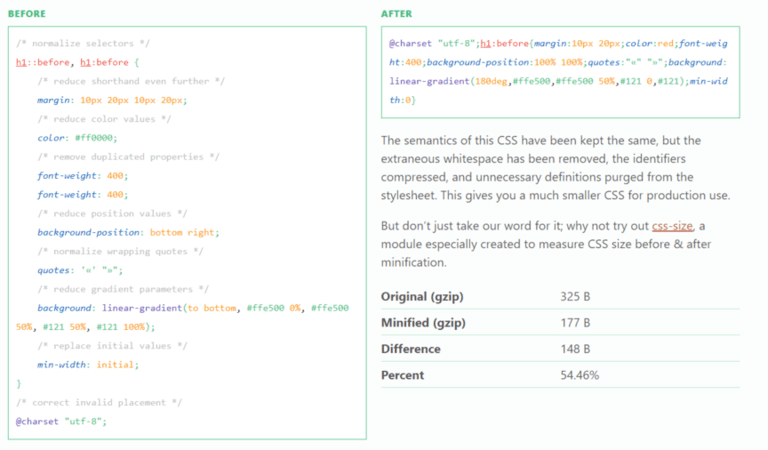 Streamline this website speed optimization process with some free, Google-recommended tools, like CSSNano or UglifyJS. If you’re not comfortable minifying code, you can always ask your developer or SEO agency (if you’re partnering with one) to handle this step.
Streamline this website speed optimization process with some free, Google-recommended tools, like CSSNano or UglifyJS. If you’re not comfortable minifying code, you can always ask your developer or SEO agency (if you’re partnering with one) to handle this step.
Try a content distribution network
Websites that receive traffic from across the world (or even the U.S.) can benefit from a content distribution network (CDN).
A CDN can help deliver your site faster by storing copies of it across the world on CDNs. A few examples of CDNs include:
If you decide to invest in a CDN, work with your development team to ensure you choose the best one for your organization. A page speed optimization service provider, like WebFX, can also offer your business advice.
Remove any render-blocking JavaScript
Render-blocking JavaScript can increase your page speed substantially. That’s because browsers will parse your page’s HTML before rendering the page for users.
If these browsers encounter a render-blocking code of JavaScript, they will have to execute it, which can increase your page speed. 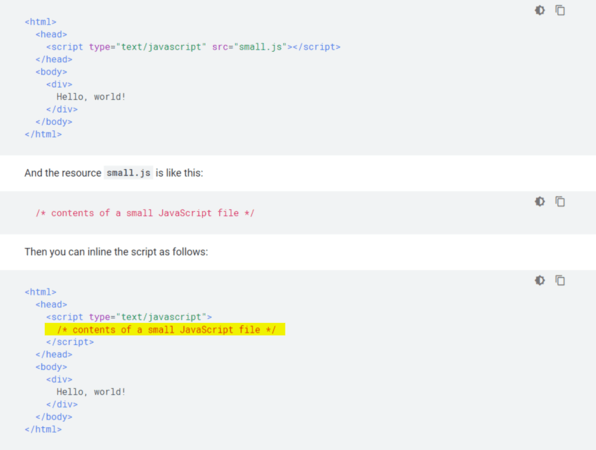 For the best results, Google recommends:
For the best results, Google recommends:
- Avoiding render-blocking JavaScript
- Using the async attribute for external JavaScript files
- Deferring render-blocking JavaScript
- Inlining render-blocking JavaScript
If you don’t have a developer background, you’ll need to work with your in-house developer, development team, or page speed optimization agency. They can help you optimize your JavaScript while keeping your website operational.
Limit your redirects
An excessive number of redirects (also known as 301s) can hurt your page speed too, which is why you want to keep your redirects to a minimum. Redirects lower page speed because they cause an HTTP request-response cycle.
Turn your site into a speed demon
Did you test your page speed and get a less-than-stellar result?
It’s okay because you’re not alone. At WebFX, our site speed team can help your business turn your site into a speed demon, providing users with a fast and seamless experience across mobile and desktop devices. With a speedier website, your company can earn higher rankings in search results, as well as more traffic, leads, and sales for growing your business.
Learn how to get started by contacting us online today about our page speed optimization services!
-
 Sarah Berry is a Lead Web Marketing Consultant at WebFX. With more than 10,000 hours of experience, she offers practical insights and strategies you can use to grow your digital revenue. When she isn’t polishing her Time Magazine Person of the Year Award, she’s spending time with her flock of ducks.
Sarah Berry is a Lead Web Marketing Consultant at WebFX. With more than 10,000 hours of experience, she offers practical insights and strategies you can use to grow your digital revenue. When she isn’t polishing her Time Magazine Person of the Year Award, she’s spending time with her flock of ducks. -

WebFX is a full-service marketing agency with 1,100+ client reviews and a 4.9-star rating on Clutch! Find out how our expert team and revenue-accelerating tech can drive results for you! Learn more
Try our free Marketing Calculator
Craft a tailored online marketing strategy! Utilize our free Internet marketing calculator for a custom plan based on your location, reach, timeframe, and budget.
Plan Your Marketing Budget

Proven Marketing Strategies

Proven Marketing Strategies
Try our free Marketing Calculator
Craft a tailored online marketing strategy! Utilize our free Internet marketing calculator for a custom plan based on your location, reach, timeframe, and budget.
Plan Your Marketing Budget
What to read next





